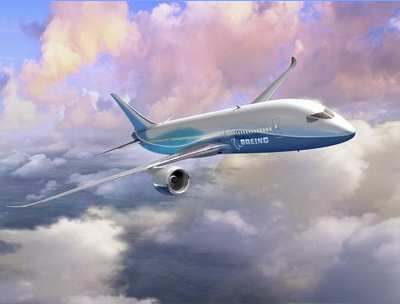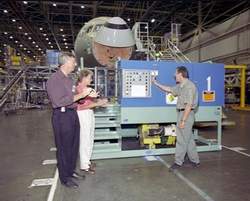Tax Refund Puts Manufacturer Over The Top
By The Motley Fool
(Last week, ANN reported that Boeing actually turned a
profit in 2003 -- thanks in large part to a tax refund for Uncle
Sam. While that may sound like good news on the surface, the boys
over at Motley Fool see it from a different angle. --
ed)
 Aircraft and defense giant Boeing
reported its annual results with earnings of $1.11 billion dollars.
These earnings are just about double last year's results. Investors
who consider this particular outcome as being meaningful will be in
error, however. From an analytical perspective, this number is the
next best thing to worthless, so let's view it, admire it, and move
on.
Aircraft and defense giant Boeing
reported its annual results with earnings of $1.11 billion dollars.
These earnings are just about double last year's results. Investors
who consider this particular outcome as being meaningful will be in
error, however. From an analytical perspective, this number is the
next best thing to worthless, so let's view it, admire it, and move
on.
Boeing's earnings per share were $0.86 for the full year. Boeing
also received a tax refund from the IRS worth $0.87 per share.
Without this tax refund, Boeing would have turned in a loss. If we
could count on Boeing receiving a tax refund every year, then this
earnings number would be of value. We can't. It isn't. What isn't
being reported -- since the "got money from the taxman" angle is so
juicy -- is that Boeing also had a one-time adjustment of $1.01 per
share to revalue goodwill from an old acquisition. Net out these
adjustments alone and you'll already get a much more accurate view
of Boeing's results from continuing operations.
Here's my question: Where is the line for the billion dollar
plus tax refunds? I mean, I know the answer for this intuitively --
it's just to the right of the line where you overpay your taxes by
a billion dollars. This is what happened with Boeing -- the tax
refund is the result of a partial settlement of a dispute with the
IRS for taxes going back as far as 1992.

This was the first quarterly earnings report for the company
since Henry Stonecipher took over last month following Phil
Condit's resignation. This has been a horrendous time for the
company, having gone through its second high-profile ethical breach
in two years, one costing a rocket project that went to rival
Lockheed Martin and losing out on large defense deals from both the
Pentagon and the British military. Further, Boeing has lost its
status as the largest commercial jet company in the world, as
European conglomerate Airbus has surpassed the company.
 But Boeing is placing hope for its
renaissance in commercial jets with its first new design in more
than a decade, the "Dreamliner," or 7E7. Crucial to Boeing's near-
to medium-term health will also be the restarting of the Pentagon
air tanker deal, valued above $16 billion dollars, in which the
company would provide 100 military planes based on the 767
fuselage.
But Boeing is placing hope for its
renaissance in commercial jets with its first new design in more
than a decade, the "Dreamliner," or 7E7. Crucial to Boeing's near-
to medium-term health will also be the restarting of the Pentagon
air tanker deal, valued above $16 billion dollars, in which the
company would provide 100 military planes based on the 767
fuselage.
Boeing's commercial airplane unit had sales decreases of 8%,
offset by 3% gains in defense. Boeing sees commercial plane
deliveries ranging at about 285 for this and next year, nearly
matching 2003's results -- 100 fewer than in 2002.
Boeing's results show why it is somewhat dangerous for investors
simply to look at price/earnings ratios to determine whether
companies are "expensive" or "cheap." The earnings number that will
be used for the next 12 months will reflect that massive tax
benefit as well as the writeoff. These two events balance each
other out to some extent, but someone who doesn't take the time to
figure out whether most recent earnings results are based on
sustainable or one-time events will be working with a numerator
that is quite off kilter.
FMI: www.boeing.com
 NTSB Final Report: Cozy Cub
NTSB Final Report: Cozy Cub ANN FAQ: Contributing To Aero-TV
ANN FAQ: Contributing To Aero-TV Classic Aero-TV: Seated On The Edge Of Forever -- A PPC's Bird's Eye View
Classic Aero-TV: Seated On The Edge Of Forever -- A PPC's Bird's Eye View ANN's Daily Aero-Linx (04.29.25)
ANN's Daily Aero-Linx (04.29.25) ANN's Daily Aero-Term (04.29.25): Execute Missed Approach
ANN's Daily Aero-Term (04.29.25): Execute Missed Approach





